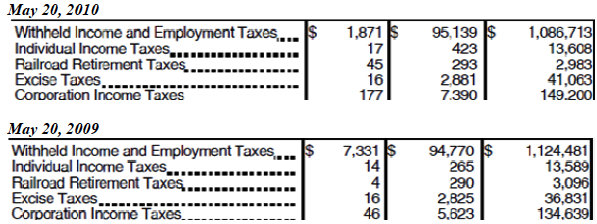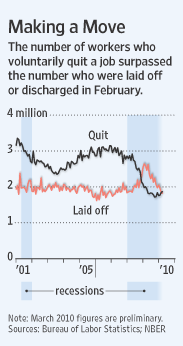One of the data points that has been getting some attention is the total withholding tax receipts, as reported by the IRS.
According to the table below, it is down year over year. Some are interpreting this to contradict BLS, and likely means that the improving jobs data are bogus. Bill King specifically noted that “as of May 20, IRS data shows Withheld Income & Employment Taxes declined 3.36% y/y. This means income is still declining and by extension, meaningful jobs are still decreasing (the BLS considers someone that has done one hour of work on the day that it samples as ‘employed’. So theoretically a person can work one hour a month and be counted as employed.)”
>
Witholding Data, 2009, 2010
click for larger table

BLS, via the King Report
>
That certainly is a possibility. Might there be a better, higher probability explanation?
I am less sure of that conclusion. While I have been skeptical over the years about BLS model changes, I do not believe they are simply making up numbers to please their political masters. Before jumping to conclusions, I suggest we consider other possibilities: If the Employment data is okay, then what might explain the change in withholding?:
– The 2009 tax cut that impacted the vast majority of salaried workers.
– A shift down the payscale by workers;
– Changes in with holding rules as part of the Stimulus package;
– Start up business founders working for little or no pay;
– Hours worked continues to get cut
We can come up with others, but each of these facts impacts the amount of dollars withheld by the IRS, and would explain a modest decrease in W/H while employment rose year-over-year.
Sometimes, we can look at the psychology of thew crowd for some insights. In this case, it is the willingness to change jobs — replace the devil you know with one you don’t — as insight into the labor market.
The WSJ reports that more employees are quitting their jobs and moving on:
“As the job market begins to loosen up, human-resource managers might increasingly be surprised by an announcement from employees they haven’t heard in a while: “I quit.”
In February, the number of employees voluntarily quitting surpassed the number being fired or discharged for the first time since October 2008, according to the Bureau of Labor Statistics. Before February, the BLS had recorded more layoffs than resignations for 15 straight months, the first such streak since the bureau started tracking the data a decade ago. Since the BLS began tracking the data, the average number of people voluntarily leaving their jobs per month has been about 2.7 million. But since October 2008, the average number dropped to as low as 1.72 million. In March, it was about 1.87 million.
And recent sentiment indicates that the number of employees quitting could continue to grow in the coming months. In a poll conducted by human-resources consultant Right Management at the end of 2009, 60% of workers said they intended to leave their jobs when the market got better. “The research is fairly alarming,” says Michael Haid, senior vice president of global solutions for Right Management. “The churn for companies could be very costly.” (emphasis added)
Why is this significant? It implies the job market is improving. Turnover more or less froze during the recession, because jobs were scarce. Even for those who found new gigs, Fear kept employees staying with the safety of the known.
Moving while the world is in flux is not something that many workers find comfortable. So the backlog of “workers waiting for better times to make a move to better jobs” is now acting like pent-up consumer demand — only for employees. The natural wanderlust of a segment of employees was suppressed, and is now busting out again.
Note that the Journal reports the median monthly voluntary turnover rate in 2009 was 0.5%, half of the rate in 2008. I’ll see if I can dig up the data for the first half of 2010 . . .
>
Sources:
More Workers Start to Quit
JOE LIGHT
WSJ, MAY 25, 2010
http://online.wsj.com/article/SB20001424052748704113504575264432377146698.html



What's been said:
Discussions found on the web: